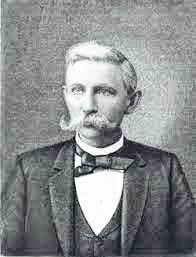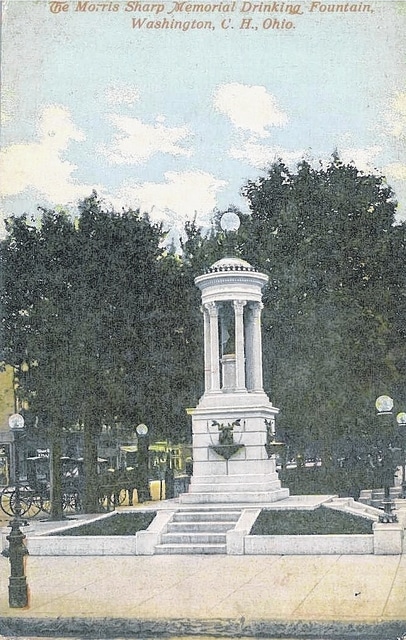

At mid-afternoon on Saturday, June 30, 1906, a crowd gathered at the intersection of Court and Market streets for the dedication of a drinking fountain recently constructed at the southwest corner of the courthouse lawn. Built in a classical design at a cost of $10,000, the large granite fountain was given to the people of Fayette County by Madeline Sharp to honor the memory of her husband Morris Sharp, who died in February 1905.
The memorial fountain is still there, although no water flows from the water spouts on its east, west, and south sides. A commemorative plaque is displayed on the north side of the fountain, while a bronze bust of Morris Sharp rests on a pedestal beneath a granite canopy.
The Reverend J. C. Arbuckle, pastor of the Grace Methodist Church, presented the fountain to George F. Robinson, the city’s mayor, on behalf of Mrs. Sharp. Arbuckle described it as a worthy memorial to Morris Sharp’s “virtuous life and honorable citizenship” and a testimony to his “fine taste and appreciation of the beautiful.” Mayor Robinson spoke next after which H. D. Chaffin, the Fayette County Auditor, accepted the gift for all the county’s citizens.
Morris Sharp was born in Brown County, Ohio, in 1838. He worked in his father’s dry goods store in nearby Jamestown before moving to Washington C.H. in 1872 to become cashier of the newly-formed Merchants and Traders Bank. In 1883, he founded the Commercial Bank of Washington C. H. and served as its president for the remainder of his life. In the early 20th century, the Commercial Bank was Fayette County’s largest financial institution.
At the time of his death in 1905, Morris Sharp was probably the county’s wealthiest man. Included among his many and varied assets were 19 tracts of the best Fayette farmland.
Mr. and Mrs. Sharp lived in the large house they built in 1875 at the juncture of Columbus and Washington avenues. The 14-room, Italianate mansion is made of bricks manufactured at a local brickyard. The Fayette County Historical Society purchased the home in 1958 and opened the Fayette County Museum there in 1965.
The Methodist Church and its tradition of Christian service was the focal point of Sharp’s life. He headed a five-man committee that oversaw construction of the former Grace Methodist Church, which was dedicated in 1895 and destroyed by fire in 1959. Sharp was an engaging Sunday school teacher and a thought-provoking lay minister. With energy and a twinkle in his eye, he delighted his Sunday school classes with the “chalk talks” he presented with blackboard, crayons, and maps. In his later years, he frequently spoke from pulpits throughout Ohio as a guest minister.
Sharp believed that the success and future of American democracy depended upon a vibrant system of public and private education. His interest in education led to his serving from 1891 until his death in 1905 as a trustee of Ohio Wesleyan University at Delaware, Ohio. He contributed generously to the school from his own resources.
Morris Sharp was a well-known leader of the Ohio temperance movement. Ever sensitive to the plight and misfortune of others, it troubled him when he saw saloons and back alley dives cynically exploiting alcoholics and derelicts, leaving them penniless and their wives and children destitute. He was a stalwart member of the Anti-Saloon League and contributed much time, money, and effort to the organization. Morris Sharp was the Prohibition Party’s candidate for governor of Ohio in 1887. His charismatic personality and persuasive damning of the liquor traffic earned him 29,700 votes. In 1887, this was the largest number of votes ever received by a third party candidate in an Ohio general election.
At Sharp’s passing, the “Christian Advocate,” a national Methodist publication, noted: “He belongs to the not overcrowded list of men who can endure prosperity, endow the rich with example, encourage the struggling by success, and comfort the worthy poor with spoken and acted sympathy.”
Fayette County was fortunate to have Morris Sharp as one of its leaders more than 100 years ago.



